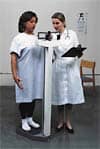Sleep apnea is associated with an increased risk of death, according to new results from the Wisconsin Sleep Cohort, an 18-year observational study supported by the National Heart, Lung, and Blood Institute (NHLBI) of the National Institutes of Health.
Researchers found that adults (ages 30 to 60) with sleep-disordered breathing at the start of the study were two to three times more likely to die from any cause compared to those who did not have sleep-disordered breathing. The risk of death was linked to the severity of sleep-disordered breathing and was not attributable to age, gender, body mass index (an indicator of overweight or obesity), or cardiovascular health status.
The 1,522 study participants included a mix of generally healthy men and women who were between the ages of 30 and 60 years when the research began. Each person was given an overnight sleep test at the beginning of the study, and then each was followed for an average of 13.8 years.
This study is the most comprehensive assessment of mortality risks associated with sleep apnea to date. The researchers note that these findings suggest that treatment of severe sleep-disordered breathing may help protect sufferers from an increased risk of death.
"Sleep-Disordered Breathing and Mortality: Eighteen-Year Follow-Up of the Wisconsin Sleep Cohort," was published August 1 in the journal Sleep.




